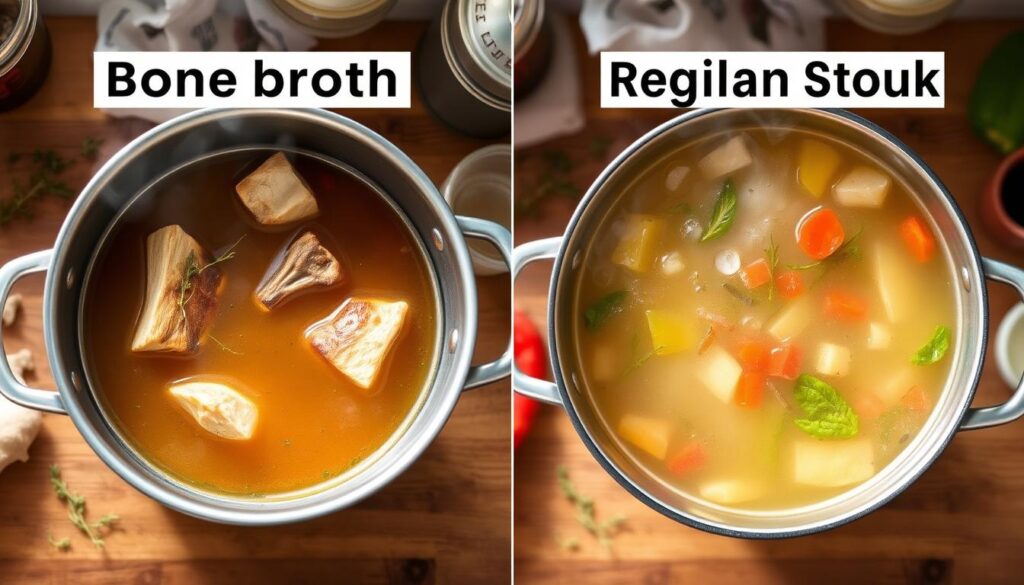Have you ever thought a simple liquid could change your health? Bone broth might be the superfood you need. It boosts your immune system and helps heal your body.
This old cooking method is now a big deal in health. It’s full of nutrients that help your body fight off sickness. Bones are simmered for 12 to 24 hours to make this special liquid.
Think of bone broth as a drink that’s full of good stuff. It has only 50 to 80 calories but lots of collagen, vitamins, and minerals. It’s not just good for you, it also helps your gut, reduces swelling, and makes your immune system stronger.
Key Takeaways
- Bone broth is a low-calorie, nutrient-rich superfood
- Contains essential amino acids and minerals supporting overall health
- Potential immune system and gut health benefits
- Can be made from various animal bones like beef, chicken, and lamb
- Supports joint health and may reduce inflammation
Understanding Bone Broth: From Ancient Wisdom to Modern Science
Bone broth is a treasure from our ancestors. It has been a key part of human history for thousands of years. It connects old medicine with today’s health practices.

Its roots go back to 1200 BC. Many cultures saw its healing power. They made their own special ways to use it.
Historical Significance in Traditional Medicine
People all over the world used bone broth for health. Here are some examples:
- Traditional Chinese Medicine saw it as a key healing stock
- Native American tribes drank it in cold winter months
- Europeans made special soups with bones, like potage
Evolution into Modern Wellness Culture
In the 21st century, bone broth became popular again. It moved from old traditions to a new wellness trend.
“Bone broth is a link between old nutrition wisdom and today’s science.” – Nutrition Experts
Scientific Perspective on Traditional Claims
Today, science is proving what our ancestors knew about bone broth. It shows its health benefits:
| Component | Health Benefit | Scientific Validation |
|---|---|---|
| Collagen | Joint Health | Supported by University of Nebraska Research |
| Glycine | Immune Support | Validated by Immunology Studies |
| Minerals | Nutritional Density | Confirmed by Nutritional Analysis |
Bone broth is a mix of old wisdom and new science. It’s a rich food that comes from traditional medicine.
What Makes Bone Broth Different from Regular Stock
Stock and bone broth are not the same. They are two different superfoods. The main difference is how they are made and the nutrients they have.
Bone broth is special because it cooks for a long time. It cooks for 12 to 48 hours. This long cooking time helps get all the good stuff from bones and connective tissues.

- Longer cooking duration (12-24 hours)
- Use of vinegar to extract deeper nutrients
- Higher concentration of collagen protein
- More complete mineral extraction
The long cooking time makes bone broth very nutritious. Regular stock cooks for only 2-3 hours. Bone broth cooks longer to get minerals like calcium, magnesium, and phosphorus.
“Bone broth is not just a soup, it’s liquid nutrition” – Nutrition Experts
Looking at the nutrition, bone broth is quite different. It has about 41 calories per serving. It has 9 grams of protein and no fat. The slow cooking keeps more amino acids and minerals than regular stock.
Choosing bone broth means you get a superfood. It’s good for your joints, fights inflammation, and boosts your immune system.
The Science of Bone Broth: A Nutrient-Packed Immune Booster

Bone broth is more than a simple soup. It’s a superfood full of nutrients. These nutrients help boost your immune system and health.
Key Nutritional Components
Bone broth is full of important nutrients. Here’s what it has:
- 54.56% of amino acids are essential for body function
- Rich in minerals like calcium, magnesium, and phosphorus
- Contains collagen and gelatin for joint and skin health
Bioavailability of Nutrients
Bone broth is special because your body can easily absorb its nutrients. The slow-cooking process makes nutrients easy to digest. This helps your body use them quickly.
Scientific Evidence Behind Immune Support
“Bone broth isn’t just a trend – it’s a scientifically-backed nutritional powerhouse.” – Nutrition Experts
Studies show bone broth boosts the immune system:
- Reduced inflammatory markers by up to 94.70%
- Increased beneficial immune response expressions
- Potential to reduce inflammation in digestive systems
A cup of bone broth is very nutritious:
- 50 calories
- 9g of protein
- 280mg of potassium
- 450mg of sodium
Adding bone broth to your diet helps your immune system. It supports your overall health naturally.
Essential Nutrients and Minerals in Bone Broth

Bone broth is full of good stuff that helps your body. Dietitians tested over 200 ingredients in 24 bone broths. They found it’s very nutritious.
Bone broth is great for natural health benefits. It has important nutrients. Here are the main ones:
- Protein: About 9-10 grams per serving
- Calories: Around 40-50 per serving
- Sodium: Between 125 to 460 milligrams
The collagen in bone broth is good for your joints and skin. It also has amino acids like glycine and proline. These help your gut and overall health.
| Mineral | Potential Benefits |
|---|---|
| Calcium | Supports bone strength |
| Magnesium | Promotes muscle and nerve function |
| Phosphorus | Aids cellular repair |
| Potassium | Regulates fluid balance |
Research shows bone broth boosts your immune system. It may also help with colds and flu.
The makeup of bone broth changes, but it always has amino acids, protein, and minerals. These can be good for your health.
When adding bone broth to your diet, remember it can vary. Homemade and store-bought are different. Start with 1 cup a day for the best benefits.
Collagen and Gelatin: The Building Blocks of Joint Health
Collagen protein is key for your body’s structure. It keeps joints strong and flexible.

Collagen is the most common protein in your body. It makes up 60% of cartilage. It supports bones, muscles, and tendons.
Types of Collagen Present in Bone Broth
Bone broth has different collagens. Each type has its own benefits:
- Type I: Supports skin, bone, and tissue health
- Type II: Promotes joint cartilage maintenance
- Type III: Helps maintain muscle and organ structure
Benefits for Joint and Bone Health
A 2016 study revealed that type 2 collagen helps knees with osteoarthritis. Collagen’s amino acids:
- Reduce joint inflammation
- Support cartilage regeneration
- Enhance overall joint mobility
Absorption and Utilization in the Body
Cooking turns collagen into gelatin. This releases amino acids like glycine and proline. These help build and repair tissues.
“Collagen is not just a supplement, it’s a fundamental building block for your body’s structural health.” – Nutrition Research Journal
| Collagen Type | Primary Function | Key Benefits |
|---|---|---|
| Type I | Skin and Bone Support | Improves skin elasticity |
| Type II | Joint Cartilage | Reduces joint inflammation |
| Type III | Muscle Structure | Supports organ health |
Bone broth has collagen, but it might not have as much as supplements. Eating it regularly and eating well can help your joints.
Gut Health and Digestive Benefits

Bone broth can change how you feel inside. It helps your gut health a lot. Almost 40% of people have digestive problems. So, knowing about bone broth is very important.
Bone broth is full of good stuff for your stomach. It has a special amino acid called glutamine. Glutamine helps your gut in many ways.
- It stops bad bacteria in your gut.
- It helps good bacteria grow.
- It keeps your gut walls strong.
- It helps your gut lining work right.
Studies on mice show bone broth’s benefits. Mice with less gut inflammation and fewer colitis symptoms drank bone broth.
“The gut is the gateway to overall health, and bone broth provides essential support for digestive wellness.” – Nutritional Research Team
Bone broth is packed with nutrients good for your stomach. It has:
| Nutrient | Digestive Benefit |
|---|---|
| Glutamine | Strengthens intestinal barrier |
| Gelatin | Supports intestinal movement |
| Amino Acids | Reduces inflammation |
Drinking 1-2 cups of bone broth a day is best. Remember, 70% of your immune system is in your gut. Bone broth is great for your health.
Bone broth is a natural way to feel better in your stomach. It’s gentle and full of nutrients. It can calm your stomach and help your gut health.
Anti-inflammatory Properties and Immune System Support
Bone broth is more than a warm drink. It’s a strong helper for your immune system. It has special nutrients that fight inflammation and keep you healthy.

The magic is in its amino acids and minerals. They work together to keep your body safe. Bone broth has important parts that boost your immune system and lower inflammation.
Mechanism of Action
Bone broth helps your immune system in several ways:
- Amino acids like arginine, glutamine, and glycine lower inflammation
- Essential minerals help your cells fight off sickness
- Collagen keeps your gut healthy, which is key for fighting off sickness
Research-Backed Benefits
“The amino acids in bone broth can potentially reduce inflammation and support immune cell activities” – Nutrition Research
| Nutrient | Immune System Benefit |
|---|---|
| Carnosine | Enhances immune cell activities |
| Glycine | Reduces inflammation |
| Arginine | Supports immune function |
Studies show bone broth is good for you. A study in Chest magazine found that chicken soup (like bone broth) fights inflammation. This helps with colds and flu.
Adding bone broth to your meals helps your immune system. It gives you a natural way to fight off sickness and inflammation.
Making the Perfect Bone Broth at Home
Making delicious homemade bone broth is easy. Start by picking the best ingredients. Learn the key steps to turn bones into a healing drink.

- Chicken bones: Full of amino acids
- Beef bones: Rich in collagen and minerals
- Marrow bones: Give deep flavors
- Knuckle and foot bones: Great for gelatin
The secret to great bone broth is slow cooking. Slow and low is the golden rule. Cook your bones for 12 to 48 hours to get all the nutrients.
“The longer you cook bone broth, the more nutrients you’ll release.” – Nutritional Expert
Here’s a quick guide to making your perfect bone broth:
| Ingredient | Quantity | Purpose |
|---|---|---|
| Bones | 3-4 lbs | Nutrient base |
| Apple Cider Vinegar | 2-3 tbsp | Nutrient extraction |
| Water | Enough to cover bones | Liquid base |
| Herbs/Vegetables | Optional | Flavor enhancement |
Pro tips for your bone broth recipe:
- Use organic, ethically raised bones for maximum nutrition
- Add an acid like apple cider vinegar to help extract more nutrients
- Strain thoroughly after cooking
- Store in refrigerator for 3-4 days or freeze for longer preservation
Your homemade bone broth is more than tasty. It’s packed with nutrients for your health, immune system, and gut.
Choosing Quality Ingredients for Maximum Benefits

When making the best bone broth, what you choose matters a lot. Using grass-fed beef bones and organic ingredients is smart. It helps you get the most health benefits.
Your bone broth’s quality depends on a few important things:
- Source of bones: Choose grass-fed beef bones or pasture-raised chicken bones
- Vegetable quality: Pick organic ingredients for better taste and health
- Cooking method: Slow-simmer to get all the nutrients
“The quality of your ingredients directly impacts the healing power of your bone broth.” – Nutrition Experts
When buying pre-made bone broth, check the labels closely. Look for brands that use slow-cooking methods and top-quality, simple ingredients.
| Bone Type | Nutrient Highlights | Best Use |
|---|---|---|
| Grass-fed Beef Bones | High in CLA, minerals | Rich, robust flavor |
| Pasture-raised Chicken Bones | Higher protein content | Lighter, versatile broth |
By choosing organic ingredients and grass-fed beef bones, you’re making more than broth. You’re making a drink full of nutrients that helps your health.
Storage Tips and Best Practices
Keeping your homemade bone broth fresh is key. It keeps its taste and health benefits for a long time.
Freezing bone broth is a smart move. It keeps it good for weeks or months. Here are some tips:
- Refrigerate fresh bone broth in airtight containers for 3-4 days
- Use glass mason jars or heavy-duty plastic containers for storage
- Leave about an inch of space at the top for expansion during freezing
- Consider portioning bone broth into ice cube trays for easy measuring
Freezing bone broth can last up to 6 months. Pro tip: Label your containers with the date of preparation to track freshness.
“The key to maintaining bone broth’s nutritional integrity is smart storage and careful handling.” – Nutritionist Dr. Emily Roberts
It’s important to reheat bone broth right:
- Thaw frozen bone broth in the refrigerator overnight
- Bring broth to a full boil when reheating
- Stir in the fat layer for additional flavor and nutrients
| Storage Method | Duration | Best For |
|---|---|---|
| Refrigeration | 3-4 days | Short-term storage |
| Freezer | Up to 6 months | Long-term preservation |
| Ice Cube Trays | 3-4 months | Portion control |
By using these storage tips, your bone broth stays fresh and tasty. It’s always ready to help your health.
Conclusion
Bone broth is more than just a food. It’s a superfood full of good stuff for your body. It helps your joints and might make your immune system stronger.
The science is growing, but bone broth’s nutrients are clear. It has collagen, minerals, and amino acids. These are good for you and easy for your body to use.
Remember, bone broth isn’t a magic fix. But it’s great for your diet. You can use it in soups, stews, or as a warm drink. Knowing its benefits and limits helps you decide if it’s right for you.


